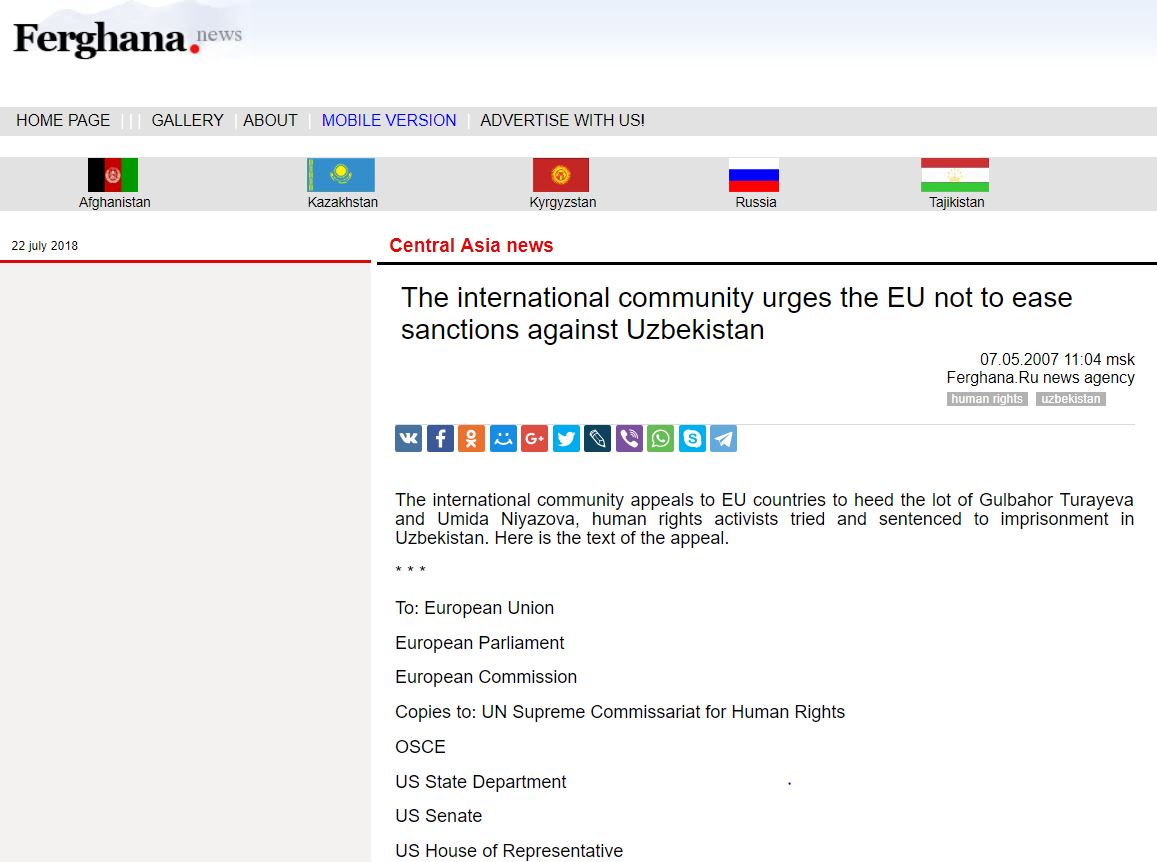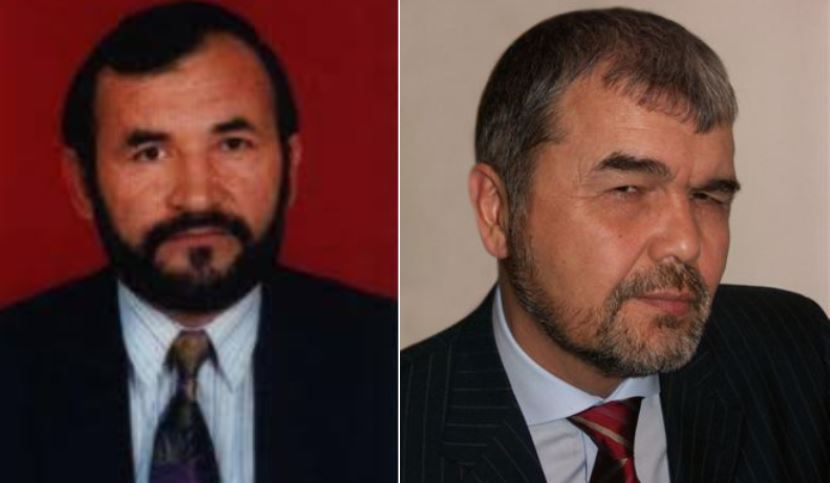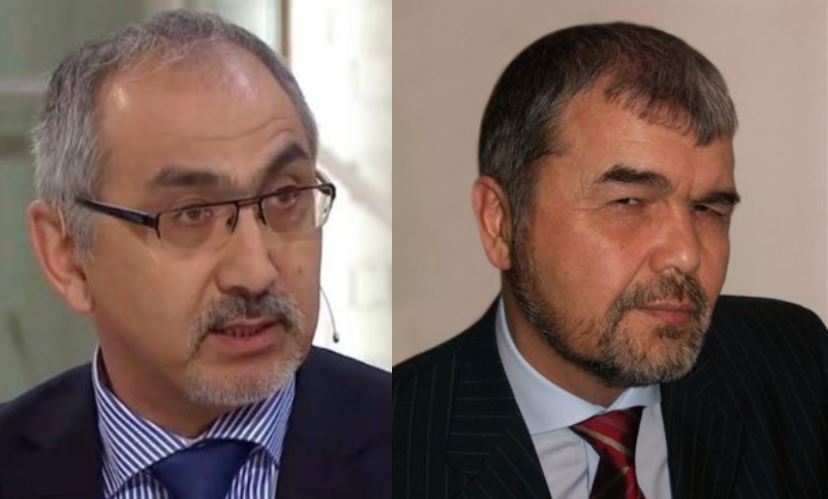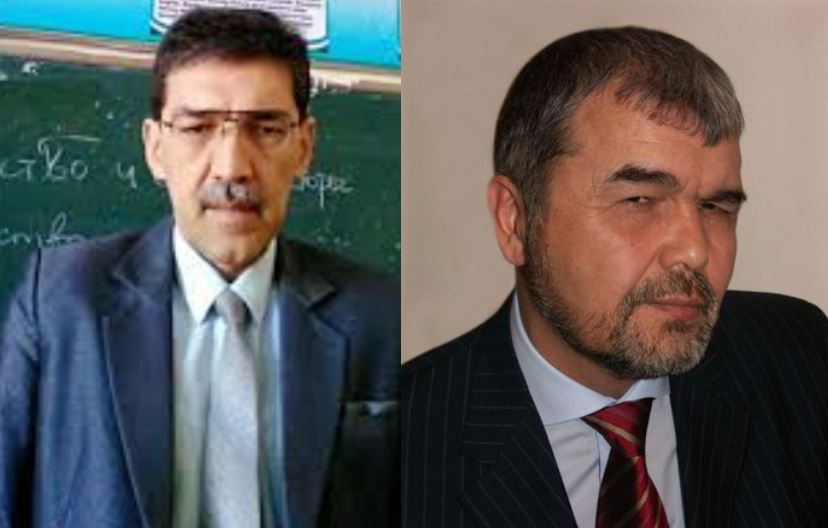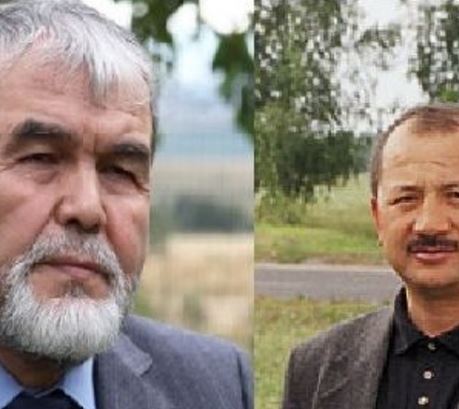The international community appeals to EU countries to heed the lot of Gulbahor Turayeva and Umida Niyazova, human rights activists tried and sentenced to imprisonment in Uzbekistan. Here is the text of the appeal.
* * *
To: European Union
European Parliament
European Commission
Copies to: UN Supreme Commissariat for Human Rights
OSCE
US State Department
US Senate
US House of Representative
International general public is upset by the rapidly deteriorating situation with human rights in Uzbekistan. Urgency of the matter does not slacken. We appeal to the European Union to remain firm in insistence on improvement of the situation with human rights in Uzbekistan and, first and foremost, on release of human rights activists and journalists from jails.
The government of Uzbekistan openly defies the terms of the ratified international treaties including the Universal Declaration of Human Rights and International Pact of Human and Civil Rights.
Turayeva, autopsist and the head of the Anima-Kor non-governmental organization, the mother of four, was sentenced to 6 years imprisonment in Andijan on April 24, 2007. Turayeva was denied the permission to choose her own lawyer or meet with her family before and during the trial. The trial lasted three days only. It took place simultaneously with the meeting of EU foreign ministers in Luxembourg on April 23 when they adopted a resolution on Central Asian countries urging the Uzbek authorities to initiate a dialogue over human rights with the European Union.
Niyazova, a journalist working for Human Rights Watch and Internet-journal Oazis, the mother of a two-year old, was sentenced to seven years imprisonment in Tashkent on May 1, 2007. Gravity of charges pressed against the human rights activist and journalist notwithstanding (smuggling, proliferation of anticonstitutional materials, illegal crossing of the border), the trial lasted two days. The sentence was passed on the eve of the EU decision to continue or suspend sanctions against Uzbekistan. Making it plain that the draconian domestic policy will continue, the authorities of Uzbekistan defy and challenge the European Union.
Both trials were undeniably political. They were organized in haste, the defense was limited (in Turayeva’s case), charges under articles of the Criminal Code (smuggling and proliferation of anticonstitutional materials) were never substantiated. Representatives of general public and foreign diplomats were not permitted in courtrooms.
Prejudiced nature of charges and trials themselves makes chances of a successful appeal or amnesty infinitesimal.
The European Union cannot remain disinterested.
What measures can the European Union take and what measures should it take? Its position should depend on appraisal of the situation in Uzbekistan. The country is slipping into totalitarianism. Niyazova was convicted for the materials from public web sites (one of Human Rights Watch, for instance) saved in her notebook which was too much even for this police state. Stiffening censorship, bans to citizens of the country to travel abroad, tortures in prisons (imprisoned dissenters Mutabar Tajibayeva, Muhammad Bekjan, Murad Jurayev are essentially on the brink of death) – all of that makes the regime one of the cruellest in the world.
Reaction of the international community to the totalitarian dictatorship in Uzbekistan should be adequate. Some stand for a dialogue and slackening of sanctions imposed in 2005 in the hope for the dialogue with its authorities over human rights. Alas! Uzbekistan would not even hear of any compromises in the matter of human rights, its position devaluing the very notion of dialogue.
Critics of the rigid policy with regard to the Uzbek leadership maintain that sanctions have failed to bring about the coveted results. It’s wrong. Even symbolic as they were, the sanctions tainted the political repute of the regime in the eyes of the international community. Hence the regime’s frantic attempts to have them lifted, even though Tashkent itself flatly refuses to meet the international community halfway.
The Uzbek regime will definitely take concessions from the EU’s part as a carte blanche for continuation of the repressions. It will have an adverse effect on all of the Central Asian region whose ruling elites will immediately get the message. It is because of Karimov’s regime to a great extent that what is taking shape on the post-Soviet territory resembles a police mega-state where refugees and immigrants are arrested and extradited to Uzbekistan on the first request from Uzbek secret services.
The situation being what it is, a consolidated and firm position of the European Union will avert Uzbekistan’s continued slide into the black hole of totalitarianism. The wheel of repressions in Uzbekistan must be stopped. Other CIS countries must be spared its deleterious influence. To accomplish that, the international community should show Karimov for what it is, an outlaw.
The European Union should not even contemplate abolition of sanctions against the Uzbek leadership as long as the latter refuses to demonstrate its allegiance to human rights in deeds and not in words. Human rights should be the core of EU strategy with regard to Central Asia.
Collection of signatures on the appeal is under way. Signatures (name, contact means) are expected at asiecentrale@neuf.fr.
Signatures collected so far:
Nadejda Atayeva, President of the Association for Human Rights in Central Asia (France)
Anvar Usmanov, free-lance journalist (Munich, Germany)
Yodgor Obid, Uzbek poet (Graz, Austria)
Queen Martin, Uzbek Initiative in the USA (New York, US)
Sergei Kovalev, President of the Institute of Human Rights, chairman of the Russian Memorial (Moscow, Russia)
Lyudmila Alekseyeva, the head of the Moscow Helsinki Group (Moscow, Russia)
Svetlana Gannushkina, the head of the Committee for Civil Assistance (Moscow, Russia)
Oleg Orlov, Chairman of the Memorial Council (Moscow, Russia)
Valentin Gefter, Director of the Institute of Human Rights (Moscow, Russia)
Olivier Dyupui, ex-deputy of the European Parliament, human rights activist (Brussels, Belgium)
Alisher Ilkhamov, researcher with the London School of African and Oriental Studies (London, Great Britain)
Andrey Babitsky, journalist, war correspondent of RL/RFE (Prague, Czech Republic)
Kudrat Babajanov, Uzbek Group for Freedom of Press (Timro, Sweden)
Natalia Estemirova, Memorial (Grozny, Russia)
Robbie Ashrafi, official of the Association for Human Rights in Central Asia in Ukraine (Kiev, Ukraine)
Yelena Ryabinina, the head of the Central Asian Refugee Assistance Program of the Committee for Civil Assistance (Moscow, Russia)
Hatam Hajimatov, web site Vatandosh editor (Olesun, Norway)
Nigina Malikova, official of the Association for Human Rights in Central Asia in the United States
Bobur Malikov, ex-ambassador of Uzbekistan to the United States (Washington, US)
Alim Atayev, member of the International Academy of Sciences Of Nature and Society, Uzbek political immigrant (France)
Safar Bekjan, member of the International PEN Club (Lausanne, Switzerland)
Aleksei Tolkachev, the head of the International Democratic Initiative Pomaranch (Kiev, Ukraine)
Nadejda Boichenko, official of the Association for Human Rights in Central Asia in Belgium
Mirsuljan Namazaliyev, member of the Borge movement (Bishkek, Kyrgyzstan)
Tatiana Rakhmanova, executive producer of Wilton Films studios (Paris, France)
Paul Mitchell, director and producer of Wilton Films studios (London, Great Britain)
Ekkehard Maas, Chairman of the German-Kazakh Society, poet (Germany)
Aud Merlen, specialist in the Caucasus, human rights activist (Brussels, Belgium)
Aileen Jensson, free-lance journalist, specialist in Russia and Central Asia (Sweden)
Alexander Osipov, member of the Memorial Council (Moscow, Russia)
Irina Zolotarevskaya, Memorial (Moscow, Russia)
Olga Popova, Memorial (Moscow, Russia)
Jan Rachinsky, the head of Memorial Information Projects (Moscow, Russia)
Matlyuba Azamatova, free-lance journalist (Zewenar, Netherlands)
Alexander Verkhovsky, Director of the Sova Center of Information and Analysis (Moscow, Russia)
Lisa Wall, journalist SR, Sveriges Radio (Sweden)
Thomas Lunderquist, journalist and producer of Swedish radio (Sweden)
Ola Wallin, owner of a publishing company Ersatz (Sweden)
Marlene Lovgren, journalist, designer-entrepreneur (Sweden)
Caroline Campbell, film producer (Sweden)
Eldar Zeynalov, Director of the Azerbaijani Human Rights Center (Baku, Azerbaijan)
Bahtiyar Hamrayev, Chairman of the Djizzak Regional Division of the Uzbek Society for Human Rights (Jizak, Uzbekistan)
Dustnazar Hudoynazarov, the head of Society for Rights of Uzbek Refugees and Immigrants (Sweden)
Avaz Fayazov, activist of the Uzbek Democratic Party Birlik People’s Movement (Sweden)
Bahodir Fayz, political scientist (United States)
Tulqin Karayev, free-lance journalist (Sweden)
Muhiddin Kurbanov, human rights activist (Sweden)
Zokirjon Ibragimov, human rights activist (Sweden)
The international community urges the EU not to ease sanctions against Uzbekistan

